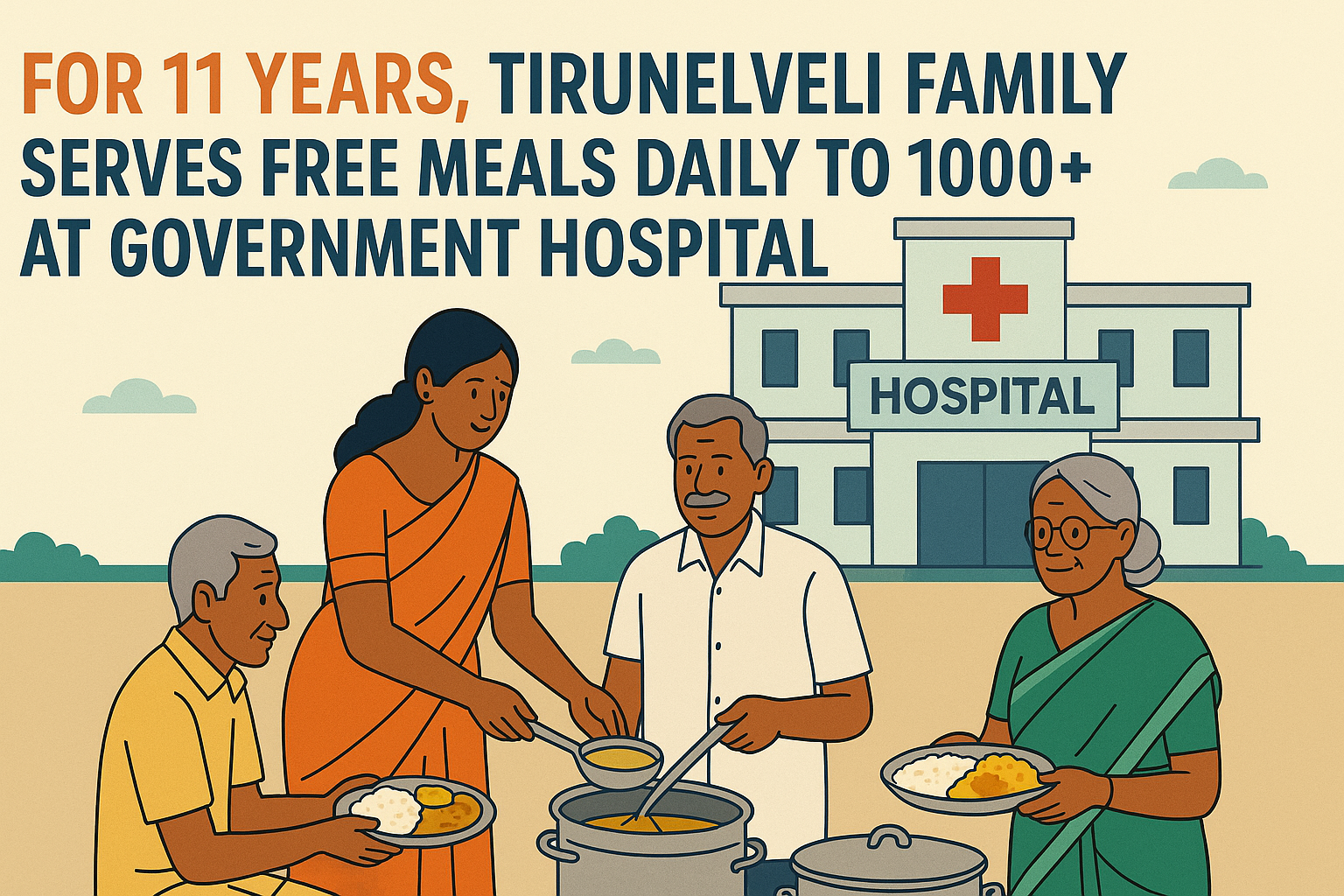Driven by compassion and community support, the Saravanan family’s service reflects a timeless Tamil ethos — that feeding the hungry is equal to saving lives.
Tirunelveli, Tamil Nadu
In a world often dominated by headlines of turmoil, a family from Palayamkottai has quietly been creating a legacy of compassion, one meal at a time. For the past 11 years, Mr. Saravanan and his family have been providing free meals every single day to patients and attendants at the Tirunelveli Government Hospital, touching thousands of lives with their tireless service.
Their mission is simple yet profound: to feed the hungry and comfort the suffering. What began as a personal gesture of kindness has now evolved into a full-fledged community initiative — supported by extended family, volunteers, and public donations.
“We’ve been doing this for 11 years now,” said Mr. Saravanan. “Every day, we provide lunch to anyone who needs it. People bring containers and take food for their loved ones admitted in the hospital.”
Daily Free Meals to 1000+ People
At a time when food inflation is hitting low-income families the hardest, this service acts as a lifeline. Around 1000 people are served daily. The meals are nutritious, freshly prepared, and reflect the warmth of a home-cooked dish — not something typically expected at a hospital gate.
Each day's menu includes:
- Two types of rice
- Herbal porridge (mooligai kanji) seasoned with cumin and pepper
- Vegetable curries and chutneys
- Curd rice — a staple served daily
- Purified drinking water in 5- and 10-liter cans
Patients and their family members are free to eat on-site or carry food in containers, ensuring flexibility for those who can’t leave their loved ones unattended.
“Even if they bring five or ten containers, we never say no,” Saravanan added with a smile.
Morning Meals for the Vulnerable
In addition to lunch, breakfast is provided in partnership with the ECR Soya Foundation, especially for:
- Elderly citizens
- Homeless individuals
- Mentally challenged persons
This segment of the service began during the COVID-19 lockdown, when access to food was severely restricted — and has continued ever since, expanding its reach to more vulnerable sections of society.
A Movement Rooted in Tamil Values
Saravanan’s inspiration echoes the ancient Tamil moral from Purananuru:
“Unndi koduththavar uyir koduththavar.”
(Those who offer food give life itself.)
To formalize the initiative, Saravanan established the Sri Agathiyar Sanmarga Sangam, an NGO that now manages the service using public contributions and local donor support.
Voices from the Ground
The real impact of this service is best captured through the words of beneficiaries:
“We came here for treatment for my father’s blood pressure. It’s been two weeks. We eat here daily — the food is clean, tasty, and feels like home.” — Attendee from Alangulam
“In the morning, I get food from outside, but for lunch, I always come here and take an extra packet for my daughter.” — Local caregiver
“This food is not just edible — it’s excellent. I’d say it’s better than what we buy from nearby eateries.” — Outpatient visitor
A Model of Social Compassion
As private healthcare becomes increasingly unaffordable, government hospitals continue to serve as the only hope for thousands. Saravanan’s work adds a crucial layer of humane support — ensuring that no one goes hungry while caring for their loved ones.
The Tirunelveli public, local authorities, and well-wishers have expressed deep appreciation and support for this initiative. Volunteers often drop by to lend a hand, and some donors have come forward anonymously to support the effort.
How You Can Help
If you wish to support this initiative:
- Volunteer for food distribution
- Donate dry groceries or utensils
- Contribute funds via verified local contacts
(Note: For donation details, please verify with local NGO contacts or hospital welfare board. Contact information is available through local community boards.)
Conclusion
In an era where acts of service often go unnoticed, the selfless efforts of Mr. Saravanan and his family serve as a shining example of grassroots kindness. Their daily commitment not only fills stomachs but restores dignity and hope — one plate at a time.


